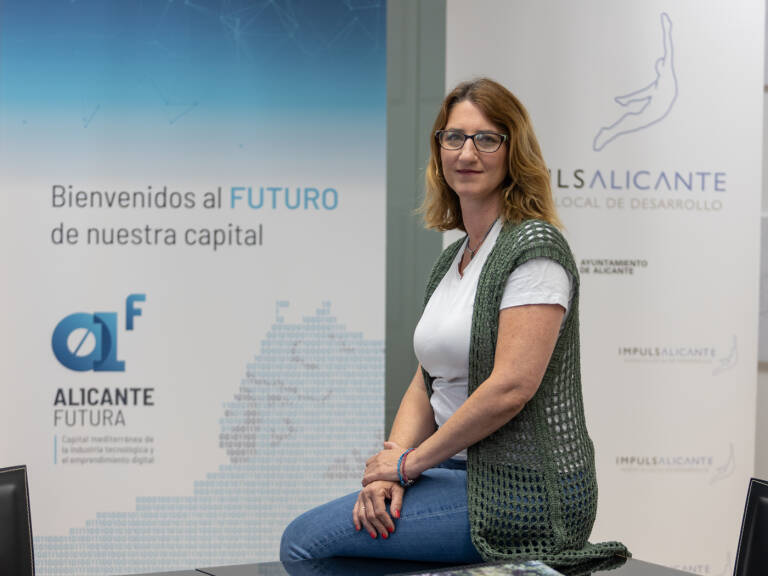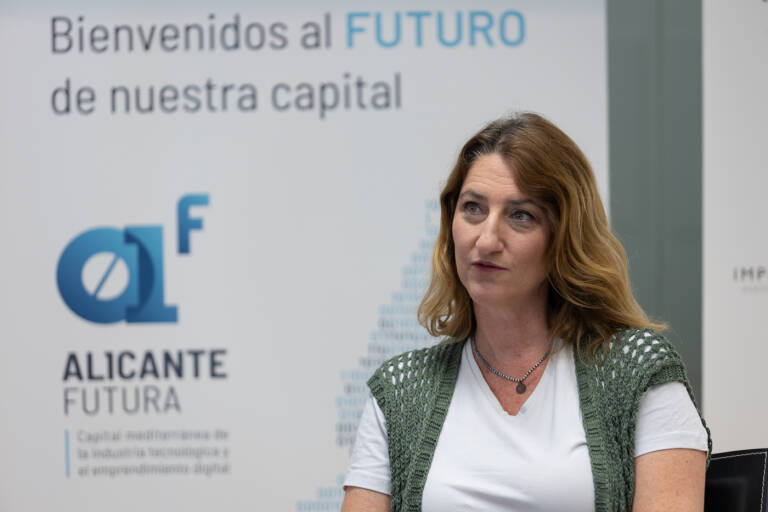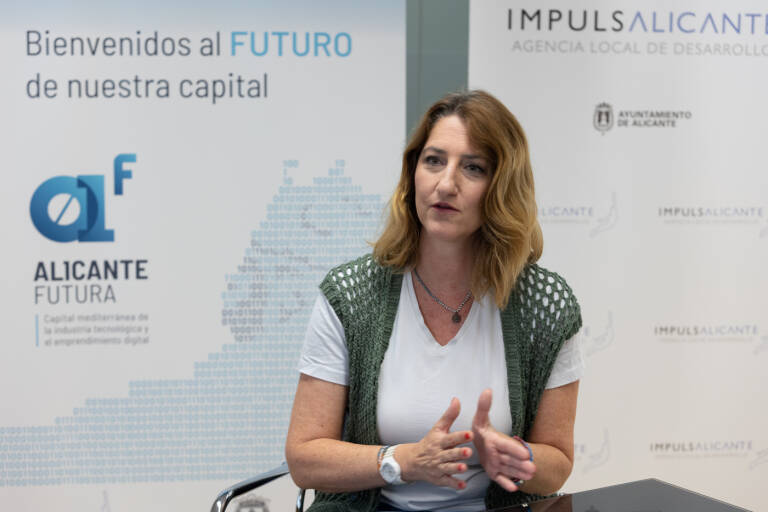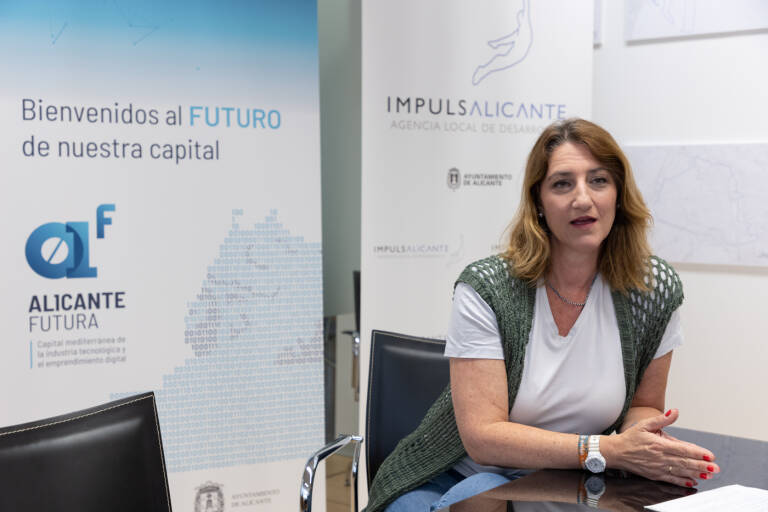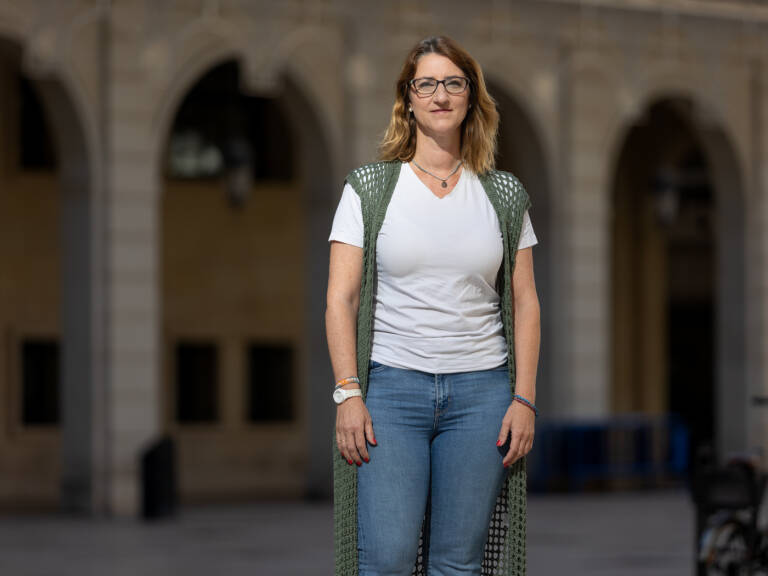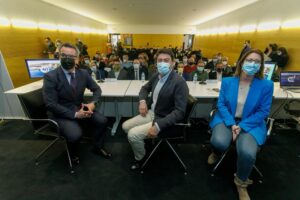3/07/2022 -ALICANTE. Shortly after the PP regained the mayoralty of Alicante, in April 2018, the government team coordinated by Luis Barcala launched the launch of a project that aimed to diversify the productive model of the city to escape from the monoculture of the service sector that would favor the implementation of innovative and technology-based companies. This project ended up being defined as a strategy under the name of Alicante Futura. And the mayor of Employment, Mari Carmen de España, assumed its reins with the mission of promoting its purposes, from May 2019.
Three years later, this initial idea is beginning to have its first reflections, after having obtained the budget to provide the necessary tools. In this conversation, De España takes stock of the operation of the strategy, in which he assures that it has already attracted a dozen top-level companies, in addition to the promotion of projects promoted by multiple startups.
-The Alicante City Council began to talk about the ‘Alicante Futura’ strategy from mid-2018, and still continues to reproach the existence of indefinition about its purposes and tasks, as argued by the political groups that exercise opposition functions. Can you define exactly what that strategy consists of?
In effect it is a strategy and therefore it is a long-term project that has its times. It was born in 2018 with the idea of starting to work a change in the city of Alicante once analyzed its opportunities and making a global vision of that improvement and that evolution that can give the city to expand an economic sector in the city that facilitates the incorporation of quality employment, outside the traditional service sector, which is what characterizes us. A transformation of these characteristics cannot be done overnight. We have worked transversally with other areas to bring the city up to speed. I am talking about areas such as Urban Planning, which is the first one involved in being able to initiate these works or processes of city transformation. In what sense? In that of expanding industrial land, in defining which spaces within the city are ideal for the implementation of companies, and we are no longer talking about industrial warehouses, but about technology-based companies that can be located within the city. These analyses and studies that we have made in our city and in the European environment, have made us see that people who worked in the technology industry came with a computer under their arm, or only needed a small space to bring a subsidiary or a delegation of their companies.
We also see the need to carry out work teams, given the breadth of the strategy, not only in the part of Alicante Futura, which tries to make Alicante become the capital of the technology industry and the new economy, but also to expand the service we had of the Investment Attraction Office and create a powerful space within the Local Agency to complement the work of adapting the city to attract technology-based companies, and the work to be done to cover aspects that investors were requiring us.
-What aspects are involved, what does a company interested in positioning itself in the city demand?
-These are aspects related to administrative procedures or providing information to investors so that they believe and know that Alicante is the best city in the world to come to work and live. All this is achieved with budgetary allocation. We have been working for a long time on the content and the budget allocation was needed. Once that was achieved, last year, we got the budget to outsource the two services, Alicante Futura and Alia. And we start up with two teams of professionals who, in coordination with the technicians of the Local Development Agency and other areas of the City Council, help us to achieve this goal: that Alicante is the city of reference for a technology-based company to settle in the city.
It has also helped a lot that other administrations are working in this direction, and I am talking about Distrito Digital or Cenid. From there, we see many other needs. This translates into creating spaces and coordination agreements with other entities and administrations so that the people of Alicante have these real employment opportunities. We work with the UA, we work to create spaces within the city, which we have called Territorios Futura, to promote training in this sense, in innovation. And also with the UA and its Science Park to retain talent, as well as with the city’s official and professional associations for the same. So that talent stays in the city. I speak in parallel, because the two services have been working at the same time. While Alia was receiving applications from companies that wanted to settle in the city. I can give very clear examples that we already know as Facephi, Navico … companies that have gone through all this guide that we have offered from the City Council and we have them implanted, with the investment that has meant that they came, plus the jobs they have generated.
And regarding the opposition, they have to be clear that this is a strategy, it is not a training academy. It materializes over time. It is materializing now. We have those Territorios Futura in which those training courses are already being given, and we are working on a boost to entrepreneurship and startups, which we are guiding so that they know how to collect investment. And we are exposing success stories with companies from the city itself, such as GDV, Next Electric, Sonneil, etc. These are issues that have already materialized. And the implementations of companies that I have already mentioned. Navico is real. Orizon has presented its new business development project, and collaborating with the Alicante City Council and Alicante Futura. Anyone who does not want to see, does not see.
-You have already said something about this, but why was this Alicante Futura strategy necessary? You have underlined the convenience of diversifying the productive model?
-Yes, in addition to diversifying the production model, to adapt to the times we are in and the times to come. New technologies, innovation and artificial intelligence are issues that have become the future. We are not only going to stick to the technological production model. It is in the traditional sectors, in industry, logistics, food…. We are not only working to bring companies that are dedicated to innovation, but also to adapt the sectors that are already in the city to make the leap to innovation that is going to be mandatory. This requires time and space. In Alicante we have very traditional sectors, such as commerce itself, and it is important to work on everything. It is not only to create a new production model, which is necessary and we have seen it in the pandemic. The challenge is to make Alicante become a city of reference for technology-based companies. We have examples nearby that have worked. Here, in addition to the climate, we have quality of life for many family profiles. From the city council we have to work to create those opportunities and create those friendly and sustainable spaces with the tools needed for companies to come to Alicante. We are living it. We are running not to lose those opportunities and they are already knocking on the door.
“FROM THE CITY COUNCIL WE HAVE TO WORK TO CREATE THOSE OPPORTUNITIES AND CREATE THOSE FRIENDLY AND SUSTAINABLE SPACES WITH THE TOOLS THAT ARE NEEDED FOR COMPANIES TO COME TO ALICANTE”.
-At first, it seemed to be a similar proposal to Distrito Digital, which now insists on underlining the collaboration…
-It is not comparable because we work in a local ecosystem. We may have similarities with Distrito Digital in terms of some kind of journey, but not in the final objective. Distrito Digital hosts technology-based companies, where they are allowed to be in a space and time, and then the companies want to make the leap to the city. The work that has been done in the Port has been in collaboration with the City Council and with Distrito Digital, because we understood, and this also goes back to 2018, that the Port was the ideal space for the implementation of companies of these characteristics. That’s what we call collaboration. We can coincide in attracting conferences, bringing some relevant company to share with businessmen or entrepreneurs very similar issues, but the objective is not the same. Not even the methodology to achieve it. Distrito Digital offers spaces, we transform the city to achieve those environments in which to house suitable spaces for companies of that type.
-No competition, then?
-No, it is collaboration in all its amplitude. One thing cannot go without the other. A foreign company that spends some time in the District and wants to remain installed in the city, must go through the city council and we must be facilitators of that work. We must collaborate. This is good for the city, for the province and for the region. We all seek to be that reference and that capital. The Generalitat itself, by placing the District in Alicante, helps to make this possible.
-You have already given some hints, but do you have a quantitative and qualitative balance of what ‘Alicante Futura’ has meant so far? How many companies have been provided with advice or which entrepreneurial projects have been helped to launch?
We can talk about about ten high-level companies installed in the city of Alicante, startups have happened a lot, which are being engines for others to knock on the door. That is the important thing. When we started this project, Valencia has Juan Roig, and in Malaga there are a lot of companies already consolidated and that makes others arrive behind. Alicante is already on that path. Having these companies as a reference is helping us to attract others and to be in the spotlight of multinationals, which are selecting us to set up in the city. We have the example of Eureka with the Vodafone project, in which all the administrations are collaborating. We did not win, we cannot win the first time. But the important thing is that Alicante is already being selected in these processes. Before we were not there, we did not appear.
-You have made several allusions to Malaga, is it the mirror in which to look? What does Alicante lack to reach that level?
-It is not that it is the mirror in which to look, it is that we have to look at where things have worked and use those that are adapted to our city. Malaga has been working along these lines for forty years and has done very well. Alicante is just starting; we cannot compare ourselves. We are on the way and I think we are doing well. Malaga has some things and Alicante has others. We have very important universities of reference. I don’t know how Malaga will work in that sense. We also have that public-private collaboration that in Alicante is serving as an impulse to promote these issues. The professional associations are working hand in hand with Alicante Futura so that their associates are involved, are aware of the strategy and can participate in it, forming communities that will attract others who are not from here and put us in the spotlight. Alicante seeks to be a reference and we touch groups, private entities, universities and other administrations.
-We have just learned that Alicante has been shortlisted to host the headquarters of the Levi’s world retail innovation center. What could this mean for the city in terms of reputation and job creation?
The fact that we have managed to get a multinational of these characteristics to put the focus back on the city of Alicante means that something is working well and we see that the Alicante Futura strategy is bearing fruit, with the creation of business ecosystems and the attraction of technology-based multinationals. This is the result of the work of the City Council, in expanding these new productive sectors. Now we are working on the best possible candidacy and on taking a step forward to have the support of the Alicante society, with the universities, with other administrations and with communities that make this multinational be convinced that Alicante is the best alternative to locate this center.
“MALAGA HAS BEEN WORKING ALONG THESE LINES FOR FORTY YEARS AND HAS DONE VERY WELL. ALICANTE IS JUST STARTING; WE CAN’T COMPARE”.
-But what are the economic implications for the city if it is selected as the site of the center?
-We have not been given specific data on investment or the number of jobs. We are still in the first phase. Then we will have other requirements, such as possible locations or issues that we will have to rework, and try to be selected in the end.
-Do you think that Alicante has options and that it can be a revenge after the Vodafone case?
-Not a revenge, because I hope that we will be selected and shortlisted many more times in other processes. We have just started and we are in the spotlight. Whatever happens, it is already a success.
-Another of Alicante Futura’s lines of work is the promotion of training in new technologies. How is it evolving?
-Alicante Futura has set up the Futura Territories throughout the city, which we use not only to mentor and promote startups, but also for training. One of the most important lines we have developed has been on-demand training. The training that investors who want to come to Alicante tell us what they need to employ. And sometimes it is not a certified training, but to know an application or a particular service that will help the incorporation into the labor market of a significant number of people. What gaps have we found? There was a lack of training in IT, programming, applications… which was what the companies that came to us were demanding. We have an agreement with the EOI, of 800,000 euros, which we have dedicated entirely to these lines of training. We complement or try to coordinate the needs of the companies with the training lines for young people. And it is working. Last time, 80% of the students who went through joined the labor market and we bet on the same thing. Now almost with more opportunities because there is more investment.
-Can anyone access this training or are there any specific requirements?
-It depends on the training, some do require a minimum training, others do not. The good thing about Alicante Futura being in the Development Agency is that any profile, from the most vulnerable, or those with less training, can go through a series of courses and evolve to prosper in getting a better job. This complementarity within the same area makes it easier for anyone, with or without training, to get a quality job.
“ONE OF THE MOST IMPORTANT LINES WE HAVE DEVELOPED HAS BEEN TRAINING ON DEMAND. THE TRAINING THAT INVESTORS WHO WANT TO COME TO ALICANTE TELL US WHAT THEY NEED TO EMPLOY”.
-In the same area, the agreement for the recovery of the trade center of the extinct Coepa has just been unblocked. What role will the Development Agency and ‘Alicante Futura’ play in this reactivation?
-A very important role. This collaboration agreement means that not only the building will be recovered faster, but also that we will be inside that space. We will share with the Generalitat, with Labora, that space and we will use it for competencies that are oriented in Alicante Futura, also in general. We will act directly. It is an opportunity, the building, the environment in which it is located…. In an industrial environment in which we have intervened to improve its streets and avenues. It is generating a private niche of training companies that makes this environment become a space in which young and not so young profiles have a friendly industrial space, within the city itself. That is what I meant by transforming the city, we work space by space and in what locations we have to improve and convert sustainable spaces where industry and innovation have a place.
-What is the status of these spaces called Territorios Futura?
-We are under construction. They will be finished between July and some in September. The tenders were put out recently and everything has its times, but we plan to start the course with the three venues to launch these Lab Futura and the conferences, digital entrepreneurship programs. It is true that for us it is very significant to start these works throughout the city and for people to see what is being done and what Alicante Futura is. When we talk about innovation, people need to see to know and understand, and that it is at everyone’s fingertips. We are developing the Focus Future, to bring the experiences of business leaders to everyone.
-But what spaces are you talking about in specific?
-The Espacio Vaillo, which is already in operation, the Tossal and the center for entrepreneurs on Cid Street. One has already been rehabilitated and the other two are in process. And we are working on the space of the old fire station on Italia Street, the Gymnasium of Ideas, which will take a little longer because of the rehabilitation work, but we hope to have it ready by 2023. See something and start using the space. In addition, the expansion of the Vivero Lanzadera de Empresas is also underway.
-When will we see the rehabilitation of the old slaughterhouse and what differences are there between the Agora Futura and the Capçalera de Innovación planned by the tripartite?
-I do not know the content of the Capçalera, I do not have a physical document where it says absolutely nothing. I could not see the rehabilitation project.
-But at least a preliminary project has been finalized….
-Yes, but no spaces were specified or adapted to innovation. There was a draft, unfinished, for the rehabilitation of a long-abandoned building. When you present a project you must have a clear idea with a specific content and a real work project to be able to execute it. It took me four years to finish the drafting project of the old slaughterhouse to turn it into Ágora Futura. I don’t know what they were thinking. It takes little time to make a canvas and hang it up. But to consolidate a rehabilitation project with a concrete content and coordinated with a city project… We work aligned with a global project of the city council, which is to transform the city, to generate opportunities. And that is the direction in which we worked on this project.
-When is the work due?
-It has been incorporated to carryovers. The tender for the execution of the work will be issued this year. It is more than 7 million. This is real, there is a budget allocation and there will be a tender. It is a fact.
-There has also been some specialization in certain areas, such as biotechnology or the blue economy. Can you explain this?
-Alicante Futura focused on those clusters and hubs that were already operating in the city. The agri-food, with Mercalicante, the biotechnology, the blue economy because of the port industry that we may have and because of the proximity to the sea and the number of sectors dedicated to water. We have a company called Aguas de Alicante where there is a total and coordinated involvement around this strategy, also with the gobtech hub. These are clusters that are not closed to expansion. Alicante has many more sectors, but we decided to start with what was already working and what was already more consolidated.
It was a matter of ordering it and starting that public-private collaboration with sectors that could do it. But we also have traditional sectors, cultural and creative industries, which are generating an important space in the city in the future; a focus of attraction around a very specific sector. It has just been announced that Ciudad de la Luz is going to become a cinematographic space again; this is going to be a before and after in this sector. In all aspects: from the most traditional jobs, to the most innovative ones, carpentry, masonry, modeling, audiovisual field… in that range of sectors. This opportunity is going to be seen. It was necessary. In addition, we will have to add other clusters such as tourism. We will have to work on it, in terms of innovation.
-You also mentioned the role of the investment attraction office, now renamed ‘Alia’. How is it working?
-It is working with a team of great professionals who are positioning the city in the best positions at all levels to become a city of reference. In addition to organizing the internal processing so that anyone from outside Alicante can come to live in the city. We talk about issues such as what real estate market we have, residential areas, health centers, schools, universities, registration procedures … which are issues that we do not have in mind, but for anyone who comes from outside is indispensable.
“WE ARE GOING TO START WITH ATALAYAS AND THAT WILL HELP US TO SOON HAVE AROUND 300,000 SQUARE METERS OF INDUSTRIAL LAND”.
Another issue to which it is dedicated is to make its own studies of the city’s environment, about which industrial areas, which spaces, which empty warehouses, which sectors are in each space, how the ecosystems of productive sectors work in the city itself. And then, to create this guide of what Alicante is and how you can live and work in Alicante to take it to fairs and congresses in which we have already participated and in which we plan to participate. We come from the South Summit in Madrid, where we have shared and received interesting people who can open lines of work. We have the Green cities, in which we are already consolidated in that fair. We were also in Hannover and other fairs and congresses scheduled to attend, and we are scheduling our own, the Alicante Futura congress.
-Any balance of these congresses? There is news of contacts with Microsoft…
-At every outing, we have tried to sit down with the best, engage in collaboration and learn from those who have all the experience. We are initiating these lines of collaboration. They may materialize soon. Not so long ago we were in Madrid, visiting them, not only with Microsoft, but also with other multinationals, with whom we are collaborating and who may possibly be with us at the Alicante Futura congress that we will hold at the end of the year. Vodafone and other companies framed in the digital world that will accompany us in this annual conference that we will start at the end of the year and that will help to turn Alicante into the Mediterranean capital of the technology industry.
-You have talked about land and location studies, is there land available for the establishment of new companies?
-Yes, we are already closing with Urbanism. It is true that in order to expand the industrial land, in addition to the fact that we have a ceiling, which comes from the Valencian territorial law, which I think we will have to work on because we have to adapt them to the times and to the current situation of each city. It is a medium-term work in which we are immersed. We will sit down with the Generalitat. But, as a previous step, we started the works of punctual modification of industrial land, in the industrial belt of Alicante, to adhere them to the beginning of the works of revision of the PGOU. But it is true that Alicante needs land now; the procedures for a specific modification of land are long, but we saw the opportunity and possibility of re-delimiting industrial spaces that will allow us to expand land to give air to the city to receive companies that need larger spaces than a warehouse.
We are going to start with Atalayas, and soon we will have defined the file with the re-delimitation of its surroundings and we will have to sit down with València to speed it up as soon as possible. Intense work has been done, in collaboration with Atalayas, but also with other industrial areas. We are going to start with Atalayas and that will mean that we will soon have around 300,000 square meters of land, which is a good place to start. Although the objective is more ambitious. In that bag is included land from Sepes, with whom we have already had meetings. We hope that this can be a reality in 2022.
Read the article here::https://alicanteplaza.es/deespaaalicantefuturatransformalaciudadparacaptarempresasyyaestamosenelfoco
Source: Alicante Plaza
